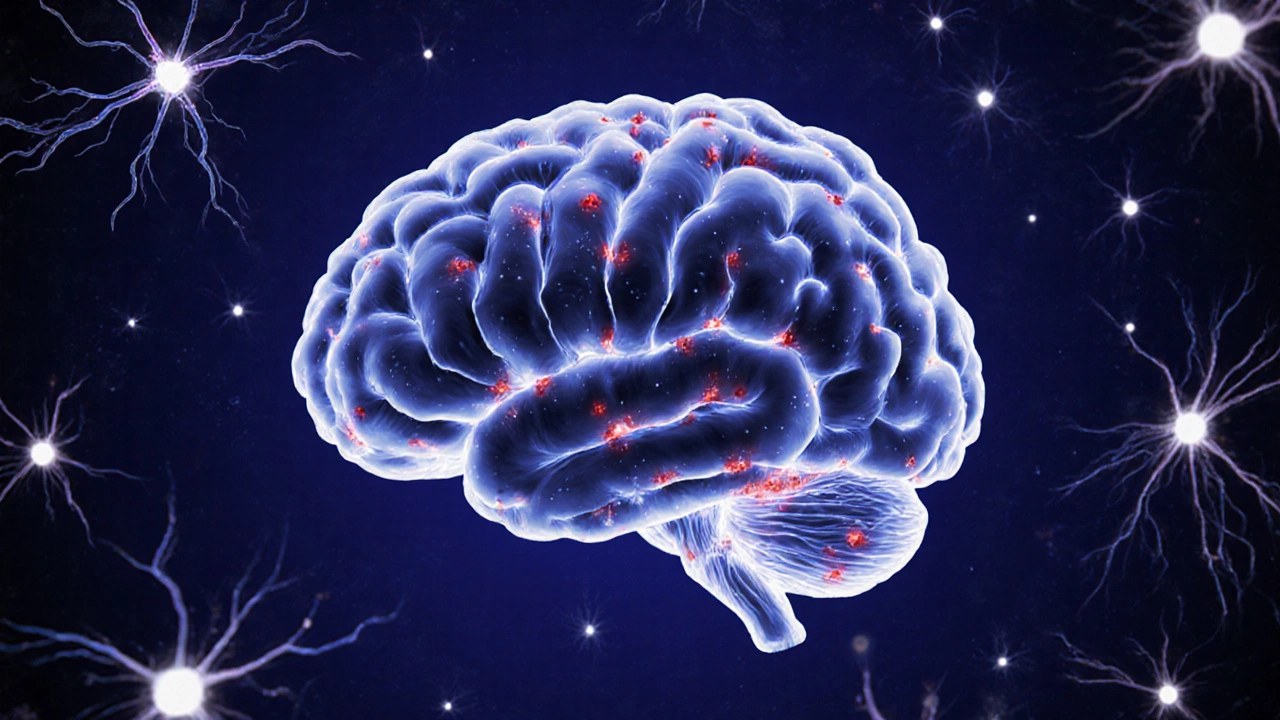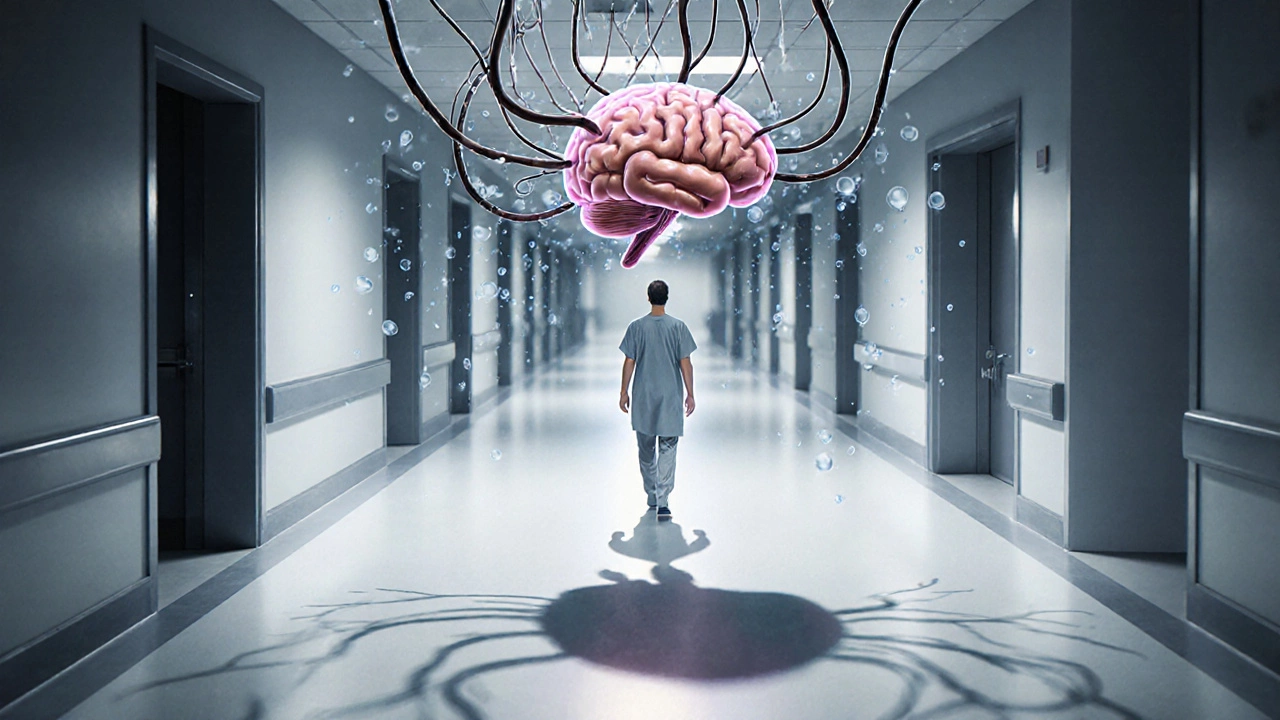Heart Surgery Cognitive Risk Calculator
This tool estimates your risk of cognitive decline after heart surgery based on factors discussed in the article. Results are for informational purposes only and do not replace medical advice.
Your Risk Assessment
Key findings: Your risk factors include:
Recommended Actions
When your heart stops during bypass surgery, your brain doesn’t. But it does get shaken-sometimes in ways you don’t notice until weeks later. People often expect recovery to mean healing the chest, regaining strength, and walking without pain. Few talk about what happens inside the skull. Yet, up to 42% of patients over 60 report trouble with memory, focus, or clear thinking after heart surgery. This isn’t rare. It’s common. And it’s not always temporary.
Why the Brain Gets Affected During Heart Surgery
Heart surgery isn’t just about fixing valves or clearing arteries. It’s a major physical shock to the whole body. During bypass, blood flow to the brain drops. Even small clots, air bubbles, or drops in blood pressure can interrupt oxygen delivery. Surgeons try to minimize this, but the heart-lung machine, while life-saving, isn’t perfect. It can stir up tiny inflammatory particles that cross into the brain. These aren’t visible on scans, but they trigger a cascade of stress signals in brain cells.
Older patients are more vulnerable. Their blood vessels are stiffer. Their brains have less reserve. A 70-year-old with decades of high blood pressure or mild diabetes already has reduced blood flow to key memory areas. Add surgery, and the brain struggles to recover. Even younger patients aren’t immune. A 50-year-old who’s never had a stroke can still wake up confused, forgetting names or struggling to follow conversations.
Brain Fog: The Most Common Aftereffect
"Brain fog" isn’t a medical term, but it’s the one patients use most. It’s that feeling of mental slowness-like your thoughts are underwater. You know the answer, but it takes longer to find it. You read the same paragraph three times. You forget why you walked into a room. This usually shows up within days after surgery and peaks around two weeks.
A 2023 study from Johns Hopkins tracked 300 heart surgery patients. At one week, 58% showed measurable decline in memory and attention. At three months, 23% still struggled. By one year, most improved-but 8% still had noticeable issues. The ones who didn’t bounce back were often those who already had mild cognitive changes before surgery. That’s the key: surgery doesn’t always cause new damage. Sometimes, it just reveals what was already there.
What the Brain Looks Like After Surgery
Scans tell a quiet story. MRIs of patients after bypass often show tiny white matter lesions-areas where blood flow was briefly cut off. These are called silent infarcts. They don’t cause strokes, but they chip away at processing speed. In older adults, these lesions are more common after heart surgery than after other major operations. The hippocampus, the brain’s memory center, often shows reduced activity in the first few weeks. It’s not dead. It’s tired. And it needs time to recharge.
Some patients develop new microbleeds-tiny spots where small vessels leaked. These are usually harmless, but they add up. Each one is like a small scratch on a hard drive. Individually, they don’t crash the system. Together, they slow it down.

Who’s at Highest Risk?
Not everyone gets brain fog. Some people sail through recovery with sharp minds. Others struggle for months. Risk isn’t just about age. It’s about what’s already happening inside your brain.
- Age over 70 - The biggest factor. Brain resilience drops sharply after 70.
- Pre-existing memory issues - Even mild forgetfulness before surgery increases risk.
- Diabetes or high blood pressure - These damage small blood vessels in the brain over time.
- History of stroke or TIA - If you’ve had a mini-stroke before, your brain is already vulnerable.
- Longer surgery time - Procedures over 4 hours increase exposure to blood flow changes.
- Use of the heart-lung machine - Off-pump bypass (done without the machine) has lower rates of cognitive decline.
One study found that patients who had off-pump bypass were 30% less likely to show cognitive decline at three months. But not everyone is a candidate. Your surgeon will weigh risks: a stable heart rhythm matters more than avoiding the machine.
Can You Prevent Brain Changes After Surgery?
You can’t control everything. But you can tilt the odds in your favor.
Before surgery: Get your blood pressure and blood sugar under control. If you’re on statins, keep taking them-studies show they reduce inflammation in the brain after surgery. Talk to your doctor about stopping blood thinners safely. Don’t quit them on your own.
After surgery: Move early. Even walking 10 minutes a day helps blood flow to the brain. Sleep matters more than you think. Poor sleep in the ICU worsens brain fog. Try to get natural light during the day and avoid screens at night.
Some hospitals now use brain monitoring during surgery-checking oxygen levels and electrical activity in real time. Ask if your hospital offers this. It’s not standard everywhere, but it’s growing.
Supplements like omega-3s or curcumin show promise in small studies, but there’s no strong proof they help. Don’t waste money on unproven pills. Focus on food: fish, leafy greens, nuts, and berries. They support brain repair naturally.

How Long Does It Last?
Most people feel better in 6 to 12 weeks. But recovery isn’t linear. Some days are sharp. Others feel foggy. That’s normal. The brain is rebuilding connections. It’s not a broken bone that heals in six weeks. It’s a network of 86 billion cells relearning how to talk to each other.
If brain fog lasts beyond three months, don’t assume it’s permanent. But do get it checked. A neuropsychologist can run tests to see if your memory, attention, and processing speed are truly impaired-or if it’s just fatigue and stress.
Some patients benefit from cognitive rehab: simple exercises like memory games, reading aloud, or learning a new skill. It’s not about becoming a genius. It’s about rewiring the brain to find new paths around damaged areas.
When to Worry
Most brain fog fades. But some signs need urgent attention:
- Sudden confusion or trouble speaking
- Weakness on one side of the body
- Severe headache with vomiting
- Loss of awareness or fainting
These aren’t normal. They could mean a stroke or bleeding. Call your doctor immediately.
For the rest-slowness, forgetfulness, trouble focusing-give yourself time. Talk to family. Keep a journal. Write down what you remember each day. You’ll see progress, even if it’s slow.
It’s Not All in Your Head
Too many people are told, "It’s just stress," or "You’re getting older." But this isn’t normal aging. This is a known side effect of a life-saving procedure. The brain is part of the system. When the heart is repaired, the brain needs repair too.
Doctors are starting to pay more attention. Hospitals in the U.S., Europe, and India now track cognitive outcomes after heart surgery. It’s no longer an afterthought. It’s part of recovery.
You didn’t just have heart surgery. You had brain surgery too-even if no one told you that. And your brain deserves the same care as your chest.






